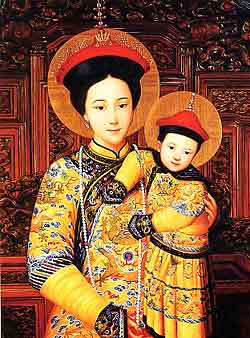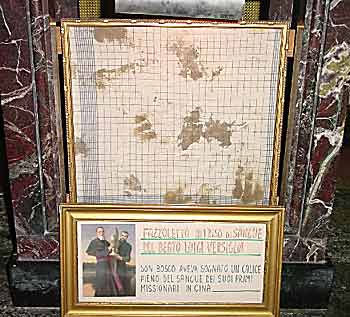

![]()
![]()
|
Newsletter of the District of Asia September-October 2000 The
First Chinese Saints! While Korea and Vietnam saw their first canonized Saints in 1984 and 1988 respectively, the Catholics of China were awaiting with a certain impatience the canonization of their Blessed Martyrs. How could China be behind these other countries, once its vassals! Moreover, on June 2, 1996, the Holy Father canonized a French missionary, St. Jean-Gabriel Perboyre who thus became, in the eyes of the whole world, the very first Saint Martyr of China.
Our Lady of China On this occasion, the Chinese bishops of Taiwan, present in Rome for the occasion, earnestly asked the Pope when would the large group of Chinese Blessed be given the supreme homage of Sainthood? The Pope assured them that it would be soon. Two months later, the Catholic newspaper of Taiwan announced that the canonization would be for the end of the year. But one must never be in a hurry when dealing with an eternal Rome. Finally, in March 2000, the great news of the canonization of the 120 Blessed Martyrs of China was announced officially. The ceremony was scheduled for October 1 of this Jubilee Year. The choice of that date is not indifferent: in the new calendar, it is the feast of St Therese of the Child Jesus, Patroness of the Missions. Everyone knows how she loved the Missions, how much she wanted to go in these far away territories “where they kill for Christ” (words of St Theresa of Avila). But October 1 is also the National Day in China, the day of the liberation, of the proclamation of the Popular Republic of China by Mao Zedong. “This Child is set for the fall and for the resurrection of many in Israel” said the old man Simeon to the Blessed Virgin (Lk 2, 34). This was going to be true also of his Members. This is always true of them when they walk in the footsteps of their Crucified Master.
Relics
of the Salesian Missionaries recently canonized It is interesting to see how, even in 2000 AD sainthood stills attracts, edifies, unites men of good will. This canonization was obviously welcome by the Catholics of China, the real Catholics, those united to Rome. But it was also welcomed by quite a number of the other ‘Catholics’, members of the Patriotic Church who realize that there is no salvation outside of the true Church, the Roman Church, and who see at the same time the mean attitude of the communist government towards the truth, and virtue practiced heroically. By members, I do not only mean the faithful. Bishop Loseph Wang Yu-chung, of Taiwan, said that a good forty bishops of China, including ‘official’ bishops recognized by Rome have written to the Pope at the beginning of this year to manifest to approval with the canonization of the Martyrs (EDA, no. 317, October 16, 2000 p.20). Bishop Joseph Zen Ze-kiun, auxiliary bishop of Hong Kong, also declared soon after the canonization that “certain sources indicate that 85% of ‘official bishops’ would have asked and obtained to be legitimized by the Pope” (EDA, p.4). Bishop Zen added that the Chinese authorities are very conscious of this movement towards Rome of their ‘Official’ Church, and, in this context, the canonization of October 1 have been for Beijing the occasion to paint the Vatican as the enemy of the nation and to force the ‘official’ clergy to chose between the pope and the Chinese nation. On October 1, throughout China, in most of the ‘official’ churches, priests and bishops had received strict orders not to celebrate the canonization of the 120 Martyrs taking place that day in Rome. Strong pressure was put on them not to even mention that event from the pulpit. On the other hand, national media related widely very strong statements of the Chinese authorities against these canonizations. An ‘official’ priest in the South related how some functionaries attended his Mass to make sure he would not speak of the canonizations. In many other Chinese areas, all the testimonies agree to say that a vast campaign against these canonizations is going on. Bishop Zen, of Hong Kong, pointed out to the Chinese authorities that if these martyrs were guilty of so great crimes, how come the Chinese authorities kept silence when they were beatified, at various moments, between 1889 and 1983? In spite of the ‘advice’ of the Chinese Government to keep “a low profile” on the occasion of the canonization, the Catholic Church of Hong Kong proceeded as scheduled with the ceremonies prepared for that day. The priests mentioned it in their sermons and in some parishes, it was possible to follow by satellite the Roman ceremonies. (EDA, no. 317, October 16, 2000, pp.2-5) This whole episode of the Catholic Church in China highlights anew a big problem which the missionaries of all times have had to face, and which, from another point of view, modern Bishops’ Conferences are bringing up again regularly. The issue is the relation between a faith which comes to us from God but is proposed to us by a Church located somewhere—obviously—on this earth, and the love of one’s nation, one’s fatherland. Just as Our Blessed Lord decided to be incarnated at a particular place and point in time, similarly, He wanted His Church to be based in Rome. There are plenty of wise reasons for the providential choice of Rome: the center of the political world at the time, the wisdom and counsel of the Romans, the Roman language, etc. However, the real issue is deeper still. Other nations have other qualities, and, absolutely speaking, Our Lord could have chosen other places for St Peter to go and die. The fundamental point is that faith is a submission of the mind to a revealed truth. Faith requires humility. Faith is an obedience, a submission to Divine truth. St Paul says it clearly in his incisive language: “The weapons of our warfare are not carnal, but mighty to God, unto the pulling down of fortifications, destroying counsels, and every height that exalteth itself against the knowledge of God; and bringing into captivity every understanding unto the obedience of Christ” (II Cor. 10, 4-5). “Bringing into captivity every understanding unto the obedience of Christ”. Making our rebellious minds and will the prisoners of His Sacred Word, of His Divine Truth, of His Sacred Heart! Indeed. And that mysterious submission to the truth “shall make (us) free” (Jo. 8, 32). Faith does require humility. I said that the refusal of this submission is unfortunately not new, I speak here at the national level. Anyone who has read in particular some lives of the missionaries of Asia, has seen it. But let us not go very far in time: the very same issue of Églises d’Asie, (received a few days ago) from which I quoted the auxiliary Bishop of Hong Kong, hits that problem, not just in China, but also in India and Japan. The Patriotic bishop of Beijing said that the October 1 canonization constituted “an open insult humiliating Chinese Catholics and the Chinese people” (EDA. p.3). In India, the fundamentalist Hindus have used the recent document ‘Dominus Jesus’, on the oneness of the True Church, to launch new attacks on the Catholic Church. A violent article dated October1 launched an appeal to Christians ‘to accept Christ but to reject the Pope” but the author to add immediately after that that for the disciples of Christ in India, the time had come to chose between India or the Vatican. (EDA, p.9) In Japan, the same document actually went almost unnoticed, except by a few theologians. The main observation of one of them was that ‘Dominus Jesus’ was too “Western” in its expressions (EDA, p.14). This is a frequent remark from the Japanese hierarchy, as can be seen in their interventions during the 1998 Asian Synod (see our newsletter May-June 1999, editorial). It was formerly also the case in Korea. More and more Asian countries today will simply not accept foreign missionaries. Sometimes, like in China, it went as far as forbidding even foreign thoughts and ideas. The problem in all that is to present God, Our Lord Jesus Christ, as foreign. It always boils down to the ‘non serviam’: I will not bow down my mind to this doctrine, I will not submit. Let us pray for the conversion of all these people as the Holy Church as always done in its history. There are so many good people among them who would embrace the truth if it was brought to them, of if they were free to accept it and practice it without persecution. Adveniat regnum Tuum, Domine! |

